SUJAWAL, SINDH: Cash-starved Pakistan raised its carbon trading sales target this month to $12 billion by launching a new mangrove plantation project at the Indus Delta in the country’s southern Sindh province that has till date sold $40 million worth of carbon credits, officials confirmed.
Known as the vertebra of Pakistan’s ecology and economy, the Indus Delta is the fifth largest in the world and home to the seventh biggest mangrove forest. According to the Sindh Forest Department (SFD), Indus Delta mangroves are unique as they are the largest arid climate mangroves in the world.
With the help of foreign private funding, on August 14, 2023, the SFD launched the new Delta Blue Carbon (DBC) — 2 mangrove plantation and restoration project in the coastal districts of Badin and Sujawal in Sindh. The DBC-2 is a continuation of the 60-year-long Delta Blue Carbon (DBC) — 1 mangrove restoration and plantation project that began in the Indus Delta in 2015 and is still carrying on.
“The current size of the Indus Delta is 670,000 hectares while the Sindh Forest Department aims to complete mangrove restoration and plantation in the Indus Delta on 450,000 hectares by 2030 though DBC-1 and DBC-2 projects,” Riaz Ahmed Wagan, chief conservator of forests in the Sindh Forest Department, told Arab News.
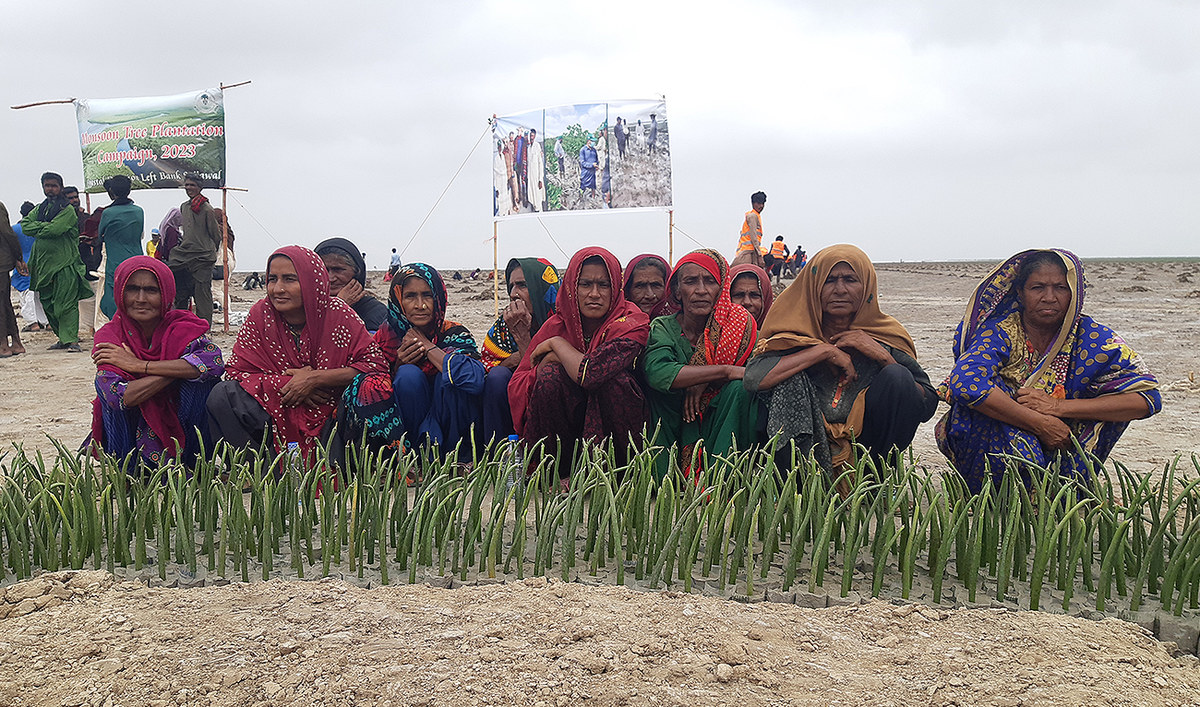
Women gardeners gesture for a group photo at an event to mark the start of the Delta Blue Carbon (DBC) - 2 project, aims to plant and restore mangroves, in Village Haji Doongar Jatt in Sujawal District on August 14, 2023. (AN Photo/ Zulfiqar Kunbhar)
“The ongoing DBC-1 project focuses on 250,000 hectares, while the new DBC-2 project plans to add 200,000 hectares in mangrove growth,” he added.
The forest department official said Sindh’s Indus Delta mangrove plantation is currently Pakistan’s only carbon credits seller project. These projects are designed to reduce or remove carbon dioxide from the atmosphere, and the resulting credits can be bought and sold on the carbon market.
Wagan said Sindh estimated to generate $7 billion in certified emission reductions (CERs) by completing the DBC-1 project by 2075. With the introduction of the DBC-2 initiative, the province aims to add an additional $5 billion by the same year, he added.
“As a result, through the combined projects Sindh is projected now to yield earnings of $12 billion by the year 2075 through carbon credit afforestation sales,” Wagan said.
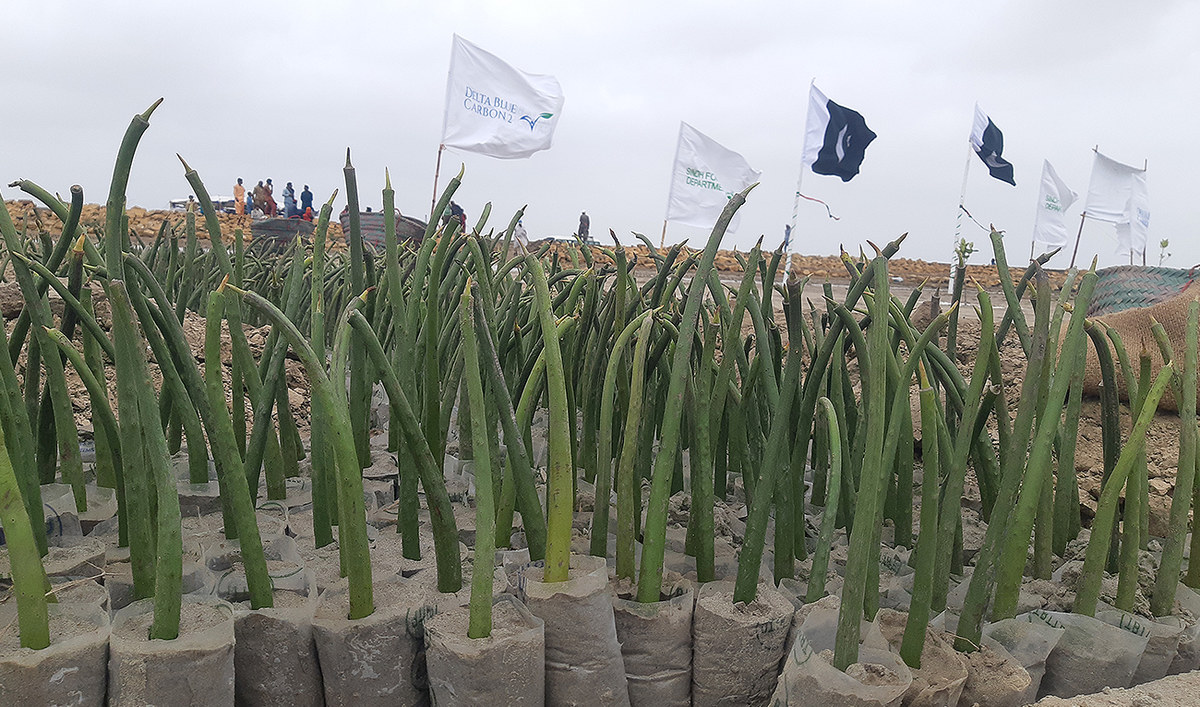
This photo shows a mangrove nursery at the launch of Delta Blue Carbon (DBC) - 2 project, aiming to plant and restore mangroves, in Village Haji Doongar Jatt in Sujawal District on August 14, 2023. (AN Photo/ Zulfiqar Kunbhar)
According to Pakistan’s Ministry of Climate Change and Environmental Coordination document much of the original area where mangroves were planted has been degraded in the Indus Delta, primarily due to freshwater diversion, over-exploitation (wood, fodder, and grazing), and land-based pollution.
The Kyoto Protocol, an international treaty of which Pakistan is also a signatory, was established in 1997 and enforced in 2005. The treaty aimed to combat climate change and set mandatory emission reduction goals for developed nations.
According to the United Nations Framework Convention on Climate Change (UNFCCC), the Clean Development Mechanism (CDM) lets countries that promised to lower their emissions as part of the Kyoto Protocol, work on projects that reduce pollution in poorer countries. These projects can earn them credits called certified emission reductions (CERs), which help them meet their Kyoto goals.
Pakistan is currently among the top ten countries most impacted by climate change in the world. Officials say as a signatory of the Kyoto Protocol, Pakistan is also making efforts to mitigate and adapt to the effects of climate change. The Indus Delta mangrove plantation is a part of these efforts.
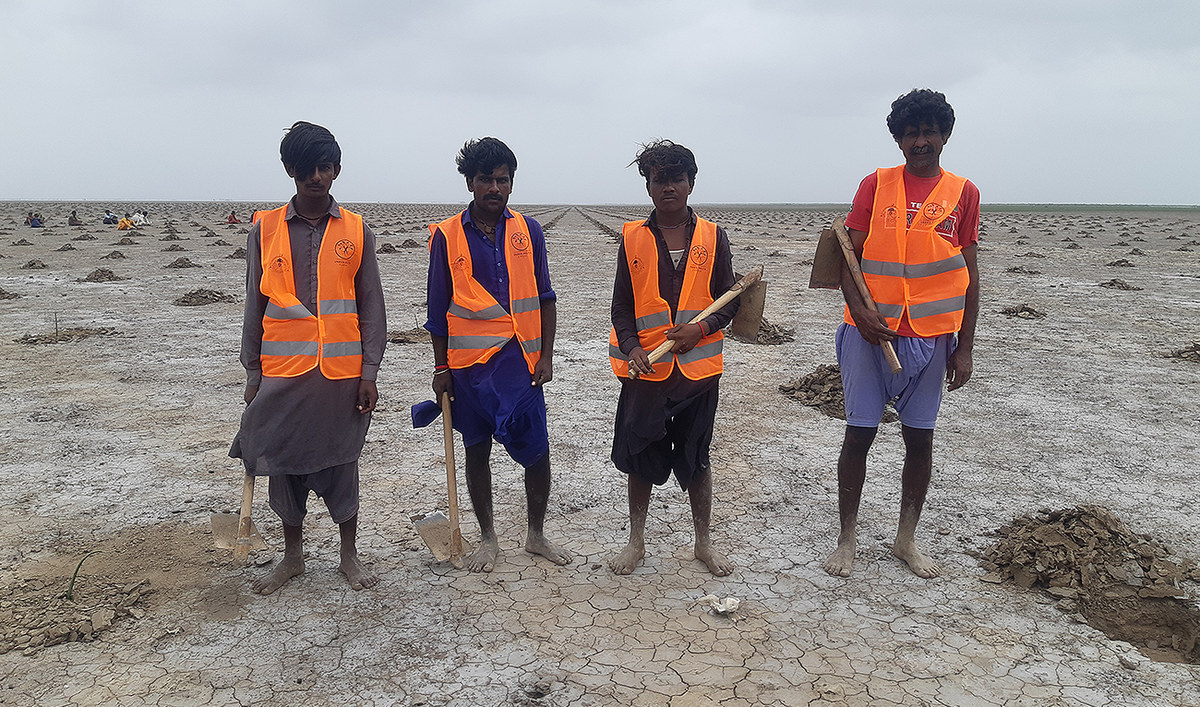
Male gardeners gesture for a group photo at an event to mark the start of the Delta Blue Carbon (DBC) - 2 project, aims to plant and restore mangroves, in Village Haji Doongar Jatt in Sujawal District on August 14, 2023. (AN Photo/ Zulfiqar Kunbhar)
As per official figures, Pakistan’s emissions in 2018 totaled 489.87 metric tons of CO2 equivalent (MtCO2e), accounting for around 0.50 percent of global carbon dioxide emissions. This suggests that the DBC-1 and DBC-2 emissions credits projects will approximately be equal to half of the country’s emissions.
“The combined carbon offsetting of Pakistan through the DBC-1 and DBC-2 projects is anticipated to reach 240 million metric tons of carbon dioxide equivalent (MtCO2e),” Wagan noted.
“Within this, DBC-1 is projected to capture 140 million metric tons of carbon dioxide equivalent (MtCO2e) through carbon credits, while DBC-2 is expected to reduce approximately 100 million metric tons of carbon dioxide equivalent (MtCO2e) through carbon credits.”
As per official figures, Sindh has sold 3.1 million carbon credits as of now, worth $40 million. By 2075, Sindh is expected to create 140 million carbon credits in the Voluntary Carbon Market (VCM) — a global system to trade carbon offsets.
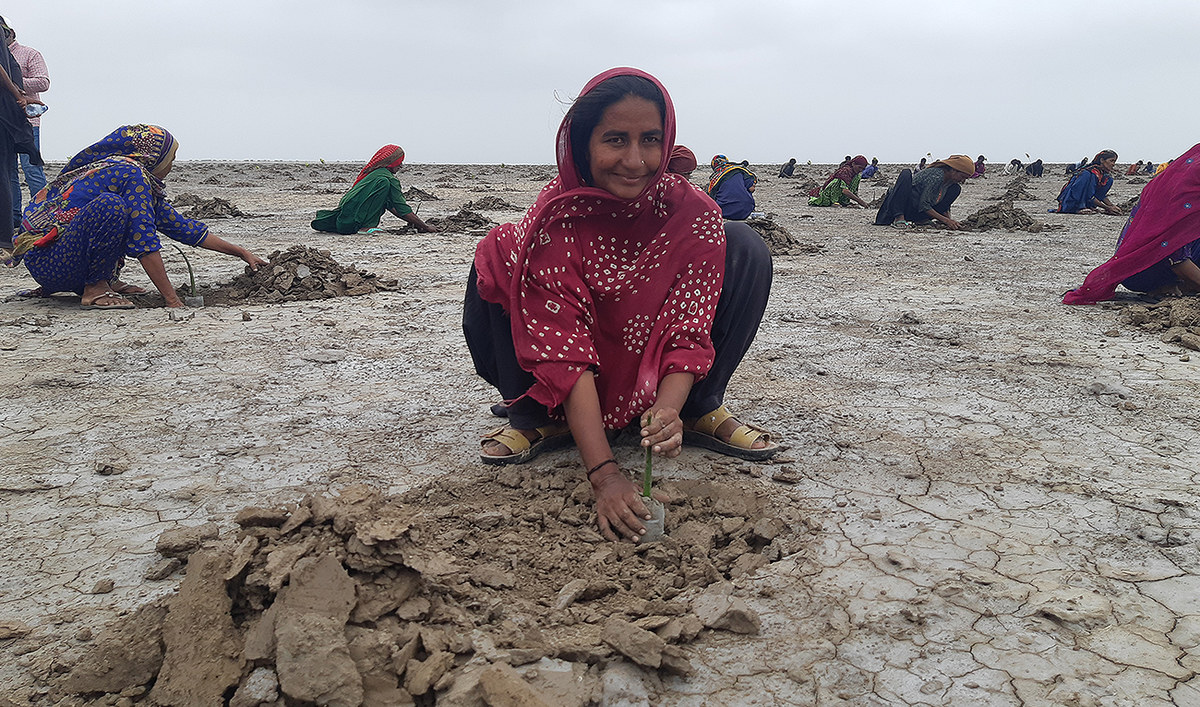
A woman gardener poses for a photo while planting mangroves in Village Haji Doongar Jatt in Sujawal District on August 14, 2023 to mark the start of the Delta Blue Carbon (DBC) - 2 project, which aims to plant and restore mangroves. (AN Photo/ Zulfiqar Kunbhar)
To date, Sindh has sold a total of $40 million worth of carbon credits in the carbon credit market through DBC-1. The value per carbon credit sold by Sindh has ranged from $12 to $50, reflecting variations in the market, Wagan said.
According to official statistics, combined foreign direct investment in DBC-1 and DBC-2 is projected to reach around $100 million, with an estimated investment of $60 million in DBC-1 and an anticipated investment of $40 million in DBC-2.
According to Waqar Hussain, a senior official at Environment, Climate Change & Coastal Development Department Sindh, the increasing mangrove cover in the Indus Delta would have a positive impact on the economy.
“Mangroves have the ability to absorb four times more carbon dioxide than other trees,” he said. “They act as protective barriers against cyclones and create habitats for aquatic life, benefiting fishing,” Hussain added.
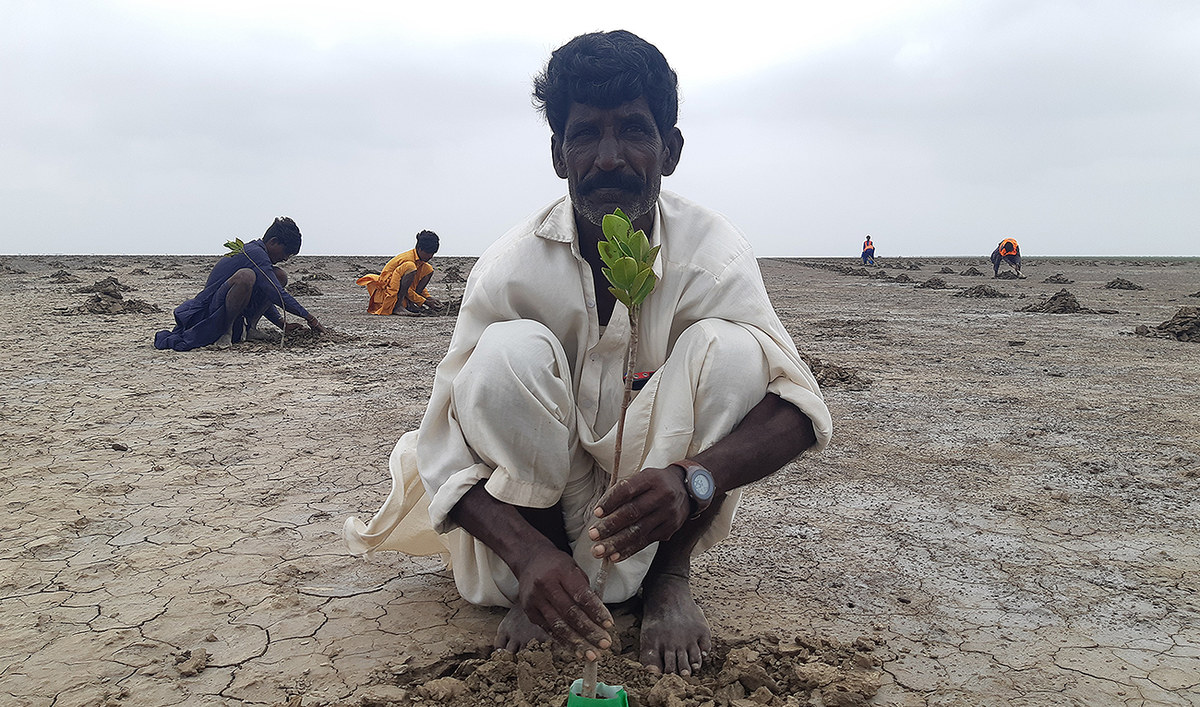
A male gardener poses for a photo while planting mangroves in Village Haji Doongar Jatt in Sujawal District on August 14, 2023, to mark the start of the Delta Blue Carbon (DBC) - 2 project, which aims to plant and restore mangroves. (AN Photo/ Zulfiqar Kunbhar)
















